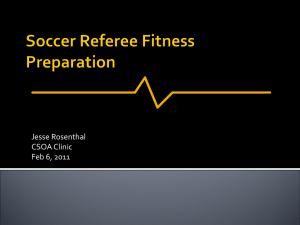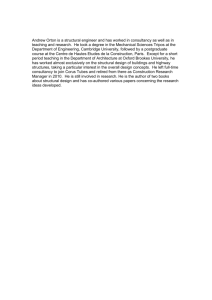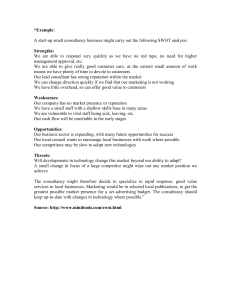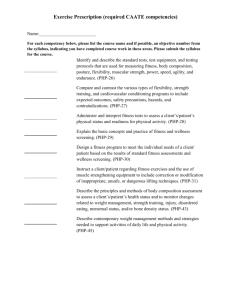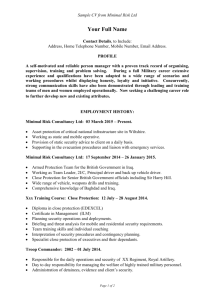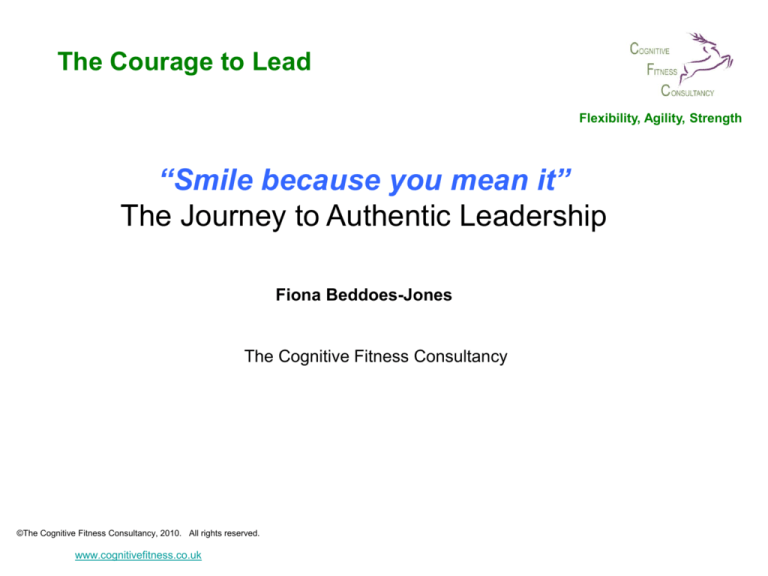
The Courage to Lead
Flexibility, Agility, Strength
“Smile because you mean it”
The Journey to Authentic Leadership
Fiona Beddoes-Jones
The Cognitive Fitness Consultancy
©The Cognitive Fitness Consultancy, 2010. All rights reserved.
www.cognitivefitness.co.uk
The Courage to Lead
Flexibility, Agility, Strength
Fiona Beddoes-Jones
• Background in business, training & development
• Business psychologist and Executive coach
• Author of Thinking Styles® & Cognitive Team Roles®
& the new Authentic Leadership 360
• Member of CIPD, IoD, BPS & ABP. Fellow of the RSA.
• Currently undertaking a PhD in Authentic Leadership
• Passionate about people, relationships & making a difference
©The Cognitive Fitness Consultancy, 2010. All rights reserved.
www.cognitivefitness.co.uk
The Courage to Lead
Flexibility, Agility, Strength
“There is a crisis
in the quality of our leadership.
Followers have lost faith
in the moral and ethical integrity of their leaders”.
©The Cognitive Fitness Consultancy, 2010. All rights reserved.
www.cognitivefitness.co.uk
The Courage to Lead
Flexibility, Agility, Strength
Objectives
To explore the concept of Authentic Leadership and its
relevance to you in your own leadership roles in today’s
complex business environment.
• What is Authentic Leadership and why is it relevant?
• What are the characteristics of a Authentic Leader?
• What are the outcomes and results of Authentic Leadership?
• What is its relevance to you?
• How do Authentic Leaders develop?
©The Cognitive Fitness Consultancy, 2010. All rights reserved.
www.cognitivefitness.co.uk
The Courage to Lead
Flexibility, Agility, Strength
What is Leadership?
Who is a Leader?
©The Cognitive Fitness Consultancy, 2010. All rights reserved.
www.cognitivefitness.co.uk
Leadership and Power
French & Raven (1960)
Flexibility, Agility, Strength
1.
Coercive power – the power to force someone to do something
Its principal goal is compliance.
Power - People - Punishment
©The Cognitive Fitness Consultancy, 2010. All rights reserved.
www.cognitivefitness.co.uk
against their will.
Leadership and Power
French & Raven (1960)
Flexibility, Agility, Strength
1.
Coercive power – the power to force someone to do something
Its principal goal is compliance.
2.
Reward power – anything we find desirable can be a reward. Withholding a reward is
a punishment.
Power - People - Punishment
©The Cognitive Fitness Consultancy, 2010. All rights reserved.
www.cognitivefitness.co.uk
against their will.
Leadership and Power
French & Raven (1960)
Flexibility, Agility, Strength
1.
Coercive power – the power to force someone to do something
Its principal goal is compliance.
2.
Reward power – anything we find desirable can be a reward. Withholding a reward is
a punishment.
3.
Legitimate power – the power divested in a role or position.
from a ‘higher’ power – one with Coercive power.
Power - People - Punishment
©The Cognitive Fitness Consultancy, 2010. All rights reserved.
www.cognitivefitness.co.uk
against their will.
Legitimacy may come
Leadership and Power
French & Raven (1960)
Flexibility, Agility, Strength
1.
Coercive power – the power to force someone to do something
Its principal goal is compliance.
2.
Reward power – anything we find desirable can be a reward. Withholding a reward is
a punishment.
3.
Legitimate power – the power divested in a role or position.
from a ‘higher’ power – one with Coercive power.
4.
Referent power - given by another person liking you or wanting to be like you, such as
Exemplars or Role Models
Power - People - Punishment
©The Cognitive Fitness Consultancy, 2010. All rights reserved.
www.cognitivefitness.co.uk
against their will.
Legitimacy may come
Leadership and Power
French & Raven (1960)
Flexibility, Agility, Strength
1.
Coercive power – the power to force someone to do something
Its principal goal is compliance.
2.
Reward power – anything we find desirable can be a reward. Withholding a reward is
a punishment.
3.
Legitimate power – the power divested in a role or position.
from a ‘higher’ power – one with Coercive power.
4.
Referent power - given by another person liking you or wanting to be like you, such as
Exemplars or Role Models
5.
Expert power – specialist knowledge or skills that are desirable or valuable to others
Power - People - Punishment
©The Cognitive Fitness Consultancy, 2010. All rights reserved.
www.cognitivefitness.co.uk
against their will.
Legitimacy may come
A brief history of Leadership
Kurt Lewin (1939)
Flexibility, Agility, Strength
1.
Autocratic / Authoritarian Leadership
The leader has the power and makes decisions, reward & punish.
2.
Democratic / Participative Leadership
The leader involves group members but retains ultimate power.
3.
Laissez-Faire / Delegated Leadership
The leader offers little guidance and devolves the power of
decision-making to the group.
©The Cognitive Fitness Consultancy, 2010. All rights reserved.
www.cognitivefitness.co.uk
A brief history of Leadership
Flexibility, Agility, Strength
1.
1940’s – Great Man theories of leadership
(Power)
Leaders are born not made. Leaders as heroic and charismatic.
Bill Gates, Bill Clinton, Genghis Khan, Steve Jobs
©The Cognitive Fitness Consultancy, 2010. All rights reserved.
www.cognitivefitness.co.uk
A brief history of Leadership
Flexibility, Agility, Strength
1.
1940’s – Great Man theories of leadership
(Power)
Leaders are born not made. Leaders as heroic and charismatic.
Bill Gates, Bill Clinton, Genghis Khan, Steve Jobs
2.
1950’s – Trait theories of leadership
(Power)
People inherit certain qualities / characteristics that make them better
suited for leadership. There is a perfect list of traits for leadership.
©The Cognitive Fitness Consultancy, 2010. All rights reserved.
www.cognitivefitness.co.uk
A brief history of Leadership
Flexibility, Agility, Strength
1.
1940’s – Great Man theories of leadership
(Power)
Leaders are born not made. Leaders as heroic and charismatic.
Bill Gates, Bill Clinton, Genghis Khan, Steve Jobs
2.
1950’s – Trait theories of leadership
(Power)
People inherit certain qualities / characteristics that make them better
suited for leadership. There is a perfect list of traits for leadership.
3.
1955 / 1965 - Contingency theories of leadership
(Power)
Particular variables in the environment or the situation will suggest the
appropriate style of leadership.
©The Cognitive Fitness Consultancy, 2010. All rights reserved.
www.cognitivefitness.co.uk
A brief history of Leadership
Flexibility, Agility, Strength
4.
1960’s – Behavioural theories of leadership
(Power)
Leadership can be learned. Leaders are made not born. The focus is
on a leaders’ actions, not their thinking or state. Black box psychology
©The Cognitive Fitness Consultancy, 2010. All rights reserved.
www.cognitivefitness.co.uk
A brief history of Leadership
Flexibility, Agility, Strength
4.
1960’s – Behavioural theories of leadership
(Power)
Leadership can be learned. Leaders are made not born. The focus is
on a leaders’ actions, not their thinking or state. Black box psychology.
5.
1970’s – Participative theories of leadership
(Power)
People are more productive when they feel engaged and involved and
have an input into decision-making. The leader retains the power.
©The Cognitive Fitness Consultancy, 2010. All rights reserved.
www.cognitivefitness.co.uk
A brief history of Leadership
Flexibility, Agility, Strength
4.
1960’s – Behavioural theories of leadership
(Power)
Leadership can be learned. Leaders are made not born. The focus is
on a leaders’ actions, not their thinking or state. Black box psychology
5.
1970’s – Participative theories of leadership
(Power)
People are more productive when they feel engaged and involved and
have an input into decision-making. The leader retains the power.
6.
1980’s – Management theories of leadership
(Punishment)
Management vs. Leadership. Leadership is about discrete transactions.
©The Cognitive Fitness Consultancy, 2010. All rights reserved.
www.cognitivefitness.co.uk
A brief history of Leadership
Flexibility, Agility, Strength
7.
1980’s - 1990’s – Relationship theories of leadership
(People)
Leadership can be used to transform people and organizations.
There is a strong ethical and moral component to leadership.
Pseudo-transformational vs. Authentic-transformational
©The Cognitive Fitness Consultancy, 2010. All rights reserved.
www.cognitivefitness.co.uk
A brief history of Leadership
Flexibility, Agility, Strength
7.
1980’s - 1990’s – Relationship theories of leadership
(People)
Leadership can be used to transform people and organizations.
There is a strong ethical and moral component to leadership.
Pseudo-transformational vs. Authentic-transformational
8.
2000 – Pro-social theories of leadership
(People)
Leadership is inter-relational and co-created between people.
Values-led leadership, Ethical leadership, Sustainable leadership.
Barak Obama, Ghandi, Mother Teresa, Superman, Nelson Mandela
©The Cognitive Fitness Consultancy, 2010. All rights reserved.
www.cognitivefitness.co.uk
A brief history of Leadership
Flexibility, Agility, Strength
4.
1980’s - 1990’s – Relationship theories of leadership
(People)
Leadership can be used to transform people and organizations.
There is a strong ethical and moral component to leadership.
Pseudo-transformational vs. Authentic-transformational
8.
2000 – Pro-social theories of leadership
(People)
Leadership is inter-relational and co-created between people.
Values-led leadership, Ethical leadership, Sustainable leadership.
Barak Obama, Ghandi, Mother Teresa, Superman, Nelson Mandela
Authentic Leadership
©The Cognitive Fitness Consultancy, 2010. All rights reserved.
www.cognitivefitness.co.uk
The Courage to Lead
Flexibility, Agility, Strength
What is Authentic Leadership?
A review of the literature reveals lengthy descriptors of what authentic
leaders do rather than a neat definition of what authentic leadership is
“The best leaders will be transparent with their intentions,
having a seamless link between their espoused values,
actions and behaviours” (Luthans & Avolio, 2003)
Someone who is ‘themselves’ (George 2003)
“Leaders who are both psychologically self-aware and philosophically
ethically sound” (Fiona Beddoes-Jones, 2007)
©The Cognitive Fitness Consultancy, 2010. All rights reserved.
www.cognitivefitness.co.uk
The Courage to Lead
Flexibility, Agility, Strength
What is Authentic Leadership?
(FBJ definitions)
A way of leading (and a way of being) that links who you are
(your beliefs and values) with how you lead and manage,
in a way that is transparent to others
A personal style of leading that is predominantly people focused
An underpinning personal philosophy of wanting to be Your Best Self
A process of leadership that has self-awareness and ethical action
at its core; combined with having the courage to REALLY lead
©The Cognitive Fitness Consultancy, 2010. All rights reserved.
www.cognitivefitness.co.uk
The Courage to Lead
Flexibility
Agility
Strength
©The Cognitive Fitness Consultancy, 2010. All rights reserved.
www.cognitivefitness.co.uk
The Courage to Lead
Flexibility
Agility
Strength
©The Cognitive Fitness Consultancy, 2010. All rights reserved.
www.cognitivefitness.co.uk
The Courage to Lead
Flexibility, Agility, Strength
Ethics and Authentic Leadership
The US military sees ethics as a part of someone’s character
e.g. honest, trustworthy
Ethics in the UK military is becoming critical:
a) integrity and transparency within a professional role
b) higher moral reasoning (as ethical capacity)
©The Cognitive Fitness Consultancy, 2010. All rights reserved.
www.cognitivefitness.co.uk
The Courage to Lead
Flexibility, Agility, Strength
Ethics and Authentic Leadership
Ethics are collective, not personal (Rodney Smith, Dept of Govt Relations, Uni of Sydney)
Ethics are formal, pro-social mechanisms, they are transparent codes of
conduct. They are based on democracy and discussion, and are agreed
E.g. British Defence Doctrine and The Rules of Engagement
The Ten Commandments
BUT, leadership is a personal style, not a collective mechanism
©The Cognitive Fitness Consultancy, 2010. All rights reserved.
www.cognitivefitness.co.uk
The Courage to Lead
Flexibility, Agility, Strength
What are the Principles of Authentic Leadership?
(i)
Before you can learn to lead others, you must learn to lead yourself
As a leader, only by trusting others and being prepared to ‘follow’ them,
will they trust you and follow you
Establishing long-term, meaningful relationships, based on trust &
respect, is the only way to achieve long-term, sustainable results
Everyone has a voice & everyone’s perspective is valuable. Therefore
taking a multi-perspective approach is always appropriate
©The Cognitive Fitness Consultancy, 2010. All rights reserved.
www.cognitivefitness.co.uk
The Courage to Lead
Flexibility, Agility, Strength
What are the Principles of Authentic Leadership?
(ii)
Tasks are important, but people are more so; ultimately,
tasks are always done by, and for, people
One size does not fit all; each authentic leader is authentic in their own
way, with their own style and a voice that is recognisable by others
Having a genuine desire to serve, and leaving a legacy,
are both critically important to an Authentic Leader
©The Cognitive Fitness Consultancy, 2010. All rights reserved.
www.cognitivefitness.co.uk
The Courage to Lead
Flexibility, Agility, Strength
What are the Characteristics of Authentic Leaders?
(i)
Higher levels of self-awareness (i.e. of oneself AND others)
Higher levels of ethics & integrity, where ethics is a capacity for moral
reasoning that links to TAKING ethical action
Courage & compassion, where ‘courage’ is used in its 15th century
meaning of having ‘heart’ & also its 20th century meaning of bravery
Higher levels of trust; in others and by others
Their own ‘voice’ which is recognisable to others
©The Cognitive Fitness Consultancy, 2010. All rights reserved.
www.cognitivefitness.co.uk
The Courage to Lead
Flexibility, Agility, Strength
Courage from old French – cuer – meaning heart
1. The heart as the source of emotion; compassion, empathy.
2. The quality of mind or spirit that enables a person to face fear.
Bravery, strength.
3. Have the courage of one’s convictions, to act in accordance with
one’s beliefs & values, especially in the face of criticism or danger.
©The Cognitive Fitness Consultancy, 2010. All rights reserved.
www.cognitivefitness.co.uk
The Courage to Lead
Flexibility, Agility, Strength
What are the Characteristics of Authentic Leaders?
(ii)
Low levels of narcissism & need for control
They know who they are at their core & are true to themselves. They
understand how their beliefs & values influence their decision making
They self-regulate their thinking & behaviour and act as a role model
They continue to develop themselves & others, & use both formal &
informal networks to get feedback & support
They dialogue constantly; with themselves & others.
They are mindful of how they effect and affect others
©The Cognitive Fitness Consultancy, 2010. All rights reserved.
www.cognitivefitness.co.uk
The Courage to Lead
Flexibility, Agility, Strength
What are the outcomes of Authentic Leadership? (i)
Interventions made by Authentic Leaders are more favourably
received by followers:
Positive outcomes such as trust, optimism and the quality of
relationships are all magnified by the lens of Authentic Leadership
(Chan et al. 2005)
Outcomes are more influential and the resultant impact is increased;
Authentic Leadership is therefore a ‘leadership multiplier’
(Chan et al. 2005)
©The Cognitive Fitness Consultancy, 2010. All rights reserved.
www.cognitivefitness.co.uk
The Courage to Lead
Flexibility, Agility, Strength
What are the outcomes of Authentic Leadership? (ii)
Long-term sustainable results & some kind of legacy
(linking to Jim Collin’s Level 5 Leaders in Good to Great & more
recent research on ethical companies achieving better results)
Followers are able to hear the leader’s voice & predict how they
would think & what they would do & use that as a positive role model
to guide their own actions
Feeling valued and trusted leads to an increased sense of well-being
by followers who will therefore ‘go the extra mile’ for the leader
©The Cognitive Fitness Consultancy, 2010. All rights reserved.
www.cognitivefitness.co.uk
The Courage to Lead
Flexibility, Agility, Strength
How do Authentic Leaders develop?
1. Naturally over time & experience
2. Through suffering & hardship
3. To promote or support a particular cause
4. As an active choice of focused development activities
A life stories approach: Shamir, Dayan-Horesh, & Adler (2005)
©The Cognitive Fitness Consultancy, 2010. All rights reserved.
www.cognitivefitness.co.uk
The Courage to Lead
Flexibility, Agility, Strength
Why would you want to become an Authentic Leader?
It’s an ideal and it’s hard work! It’s not an ‘easy’ path to tread!
It’s a constant & ongoing journey. It’s almost impossible to achieve
If you stick to your values & ethics you may be attacked by others;
hence the need for courage and resilience in the face of disagreement
You will constantly be challenged & tested by others & by situations;
emotionally, intellectually & in terms of your own resilience
If you don’t want to be ‘your best self’ – if all you want are the
magnified, positive results that AL can bring, people will see
through you because you are not being an authentic leader!
©The Cognitive Fitness Consultancy, 2010. All rights reserved.
www.cognitivefitness.co.uk
The Courage to Lead
Flexibility, Agility, Strength
How do we develop Authentic Leaders
& promote Authentic Leadership? (a brief summary)
A personal journey or a series of focused temporal inputs …………?
A focus on developing self-awareness & a people orientation
A focus on helping leaders to find out what their ethical boundaries
are and how to operate within them
Encouraging debate & dialogue; being reflective & reflexive
Values driven leadership development; multi-perspectives, a
generosity of spirit, compassion & the courage to do the right thing
©The Cognitive Fitness Consultancy, 2010. All rights reserved.
www.cognitivefitness.co.uk
The Courage to Lead
Flexibility, Agility, Strength
What next?
You have reached a choice point ……….
You can continue leading your life & your organization as you are
currently doing, OR you could decide to take some more steps
towards getting to know your ‘best self’ & of being the best that
you can be ......... for the benefit of others
It’s up to you …………. Do you have The Courage to Lead?
©The Cognitive Fitness Consultancy, 2010. All rights reserved.
www.cognitivefitness.co.uk
The Courage to Lead
If you want to learn more…..
14th September 2011 Authentic Leadership: The Courage to Lead
CONFERENCE A sustainable future built on trust
http://authentic-leadership.blogspot.com has a useful resources page
True North, Discover your Authentic Leadership by Bill George, 2007
Bill George, Peter Sims, et al., Discovering Your Authentic Leadership,
Harvard Business Review, February 2007
http://hbr.org/2007/02/discovering-your-authentic-leadership/ar/1
Daniel Goleman, What Makes a Leader?, Harvard Business Review, 1998
http://hbr.org/2004/01/what-makes-a-leader/ar/1
©The Cognitive Fitness Consultancy, 2010. All rights reserved.
www.cognitivefitness.co.uk

